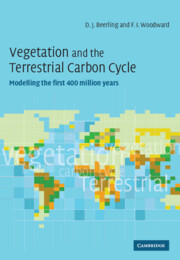Book contents
- Frontmatter
- Contents
- Preface
- Acknowledgements
- 1 Introduction
- 2 Investigating the past from the present
- 3 Climate and terrestrial vegetation
- 4 Climate and terrestrial vegetation of the present
- 5 The late Carboniferous
- 6 The Jurassic
- 7 The Cretaceous
- 8 The Eocene
- 9 The Quaternary
- 10 Climate and terrestrial vegetation in the future
- 11 Endview
- References
- Index
8 - The Eocene
Published online by Cambridge University Press: 09 August 2009
- Frontmatter
- Contents
- Preface
- Acknowledgements
- 1 Introduction
- 2 Investigating the past from the present
- 3 Climate and terrestrial vegetation
- 4 Climate and terrestrial vegetation of the present
- 5 The late Carboniferous
- 6 The Jurassic
- 7 The Cretaceous
- 8 The Eocene
- 9 The Quaternary
- 10 Climate and terrestrial vegetation in the future
- 11 Endview
- References
- Index
Summary
Introduction
The early/middle Eocene (55–50 Ma) was the warmest interval of the past 65 million years, and represents the last time the Earth operated in a strong ‘greenhouse’ mode with a configuration of the continental land masses close to that of the present day. Although the Miocene (15 Ma) was a more recent episode of non-glacial climate, it did not have the extreme warmth of the middle Eocene, particularly regarding the maintenance of warm, high latitude surface temperatures (Barron, 1987), as indicated by marine oxygen isotope data (Shackleton & Boersma, 1981; Zachos et al., 1994). Climate modelling studies have shown that the overall Eocene warmth was compatible with a higher-than-present partial pressure of atmospheric CO2 (Sloan & Rea, 1995). This suggestion is supported by modelling of the long-term carbon cycle which predicts values during the Eocene of 600–900 ppm CO2 (Berner, 1994), and by geochemical estimates based on the isotopic composition of marine (700 ppm) (Freeman & Hayes, 1992) and terrestrial carbon (300–700 ppm) (Sinha & Stott, 1994) (Fig. 8.1). These studies therefore provide direct and indirect evidence for the operation of a high CO2 greenhouse effect during the Eocene. However, further mechanisms are thought to have operated, causing increased polar warmth without significant warming of the tropics (e.g. Sloan et al., 1995; Valdes, 2000).
- Type
- Chapter
- Information
- Vegetation and the Terrestrial Carbon CycleThe First 400 Million Years, pp. 238 - 279Publisher: Cambridge University PressPrint publication year: 2001



